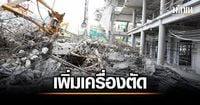In the wake of a devastating earthquake that struck Thailand on March 28, 2025, experts are voicing significant concerns regarding the country's preparedness for seismic events, particularly in relation to the monitoring of active fault lines. The earthquake, which has left a profound impact on the nation's infrastructure and safety protocols, has prompted calls for increased funding and the establishment of a centralized disaster management organization akin to the Federal Emergency Management Agency (FEMA) in the United States.
Dr. Suthisak Srilumph, head of the Center of Excellence in Innovation and Development of Agricultural Resources and Infrastructure at Kasetsart University, highlighted the need for a comprehensive approach to disaster management during a seminar titled "Living with Risks: How to Ensure Sustainable Safety" organized by the Department of Mineral Resources. He emphasized the importance of understanding the locations and histories of fault lines to effectively prepare for future earthquakes.
According to Dr. Suthisak, the recent earthquake revealed that while the main structures of many buildings remained intact, significant damage occurred to non-structural components. "Most of the damage was not severe enough to compromise the buildings' overall integrity, but several structures have been deemed unsafe for occupancy," he stated.
One of the critical issues raised is the alarming lack of funding allocated for fault line surveys in Thailand. Dr. Suthisak pointed out that the budget for monitoring these geological features is disproportionately small compared to expenditures on other infrastructure projects. He argued that this underfunding could lead to insufficient data on fault lines, increasing the risk of unpreparedness for future seismic events.
"The limited budget could hinder thorough and comprehensive fault line surveys, leaving Thailand vulnerable to earthquakes without adequate warning," he cautioned. The need for such surveys is underscored by the presence of several active fault lines in the country that have the potential to trigger significant seismic activity.
To address these challenges, Dr. Suthisak and other experts are advocating for the establishment of a dedicated organization to oversee disaster management in Thailand. This body would centralize efforts and resources, ensuring a more coordinated and effective response to natural disasters. The proposed organization would consist of personnel with expertise in disaster management, capable of making quick and informed decisions during emergencies.
In addition to advocating for better funding and organizational structure, experts stress the importance of public awareness and preparedness. The recent earthquake has heightened concerns among citizens regarding the safety of residential and commercial buildings, particularly high-rise structures in urban areas. Many people are now more aware of the potential risks and are calling for increased transparency and action from government officials.
As the situation develops, the government has already begun to take steps to address the aftermath of the earthquake. On April 15, 2025, N.S. Thawida Kamolwech, Deputy Governor of Bangkok, announced the ongoing efforts to clear the debris from the collapsed buildings, which have left 44 people dead, 9 injured, and 50 reported missing. The search and rescue operations are complicated by the presence of steel rebar obstructing access to certain areas, prompting officials to deploy additional machinery to aid in the recovery efforts.
"We are committed to ensuring that all missing persons are accounted for and that the affected families receive the support they need," Thawida stated during a press briefing. The government has also increased the compensation for the families of the deceased to 100,000 baht per victim, regardless of their role within the family unit.
Furthermore, the government is working closely with forensic experts to identify the victims, with 91 out of 103 names already confirmed. Efforts are underway to coordinate with international agencies to assist in the identification process, particularly for those who may have cross-border connections.
As Thailand grapples with the aftermath of the earthquake, the call for improved disaster preparedness and response systems has never been more urgent. Experts are advocating for a proactive approach that includes better funding for geological surveys, the establishment of a centralized disaster management agency, and increased public awareness initiatives.
In conclusion, the recent earthquake has served as a wake-up call for Thailand, highlighting the critical need for enhanced disaster preparedness measures. With the right investments and organizational frameworks in place, the country can better equip itself to face the challenges posed by natural disasters and safeguard the lives of its citizens.






